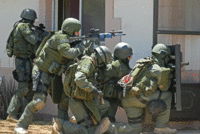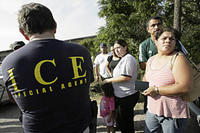-
New SPEXER security radar offers new capabilities in threat detection
Cassidian, the renamed defense and security division of EADS, is showing its new security radar; the company says that SPEXER 2000 is the first security radar using the newest radar technology of Active Electronically Scanning Array (AESA); by electronic guidance of the radar beam, this technology enables the sensor to fulfill several tasks at the same time while increasing the detection capability substantially; therefore, one SPEXER 2000 can replace two or more conventional radars
-
-
House Republicans slash funds for border security, immigration enforcement
House Republicans voted to slash spending for border security and immigration enforcement for the remainder of this fiscal year by an estimated $600 million; the House budget allocates $350 million less for border security fencing, infrastructure, and technology than Congress approved last year, and $124 million below what DHS requested; the bill also cuts an estimated $159 million over last year for Customs and Border Protection modernization and construction programs, and is $40 million less than the agency sought to get the job done
-
-
Chipotle fired 450 workers in Minnesota for lack of legal documents
Chipotle, in a filing last week with the Securities and Exchange Commission, disclosed that it had let go of 450 people in its Minnesota restaurants after the employees failed to prove they were eligible to work in the United States; the Denver-based chain has been subject to DHS audit for employees’ documents
-
-
Bill would allow police to turn illegal immigrants over to members of Congress
A new proposal from Texas state Rep. Lois Kolkhorst would allow law enforcement officials to drop off illegal immigrants at the offices of any U.S. senator or representative; the proposed bill only applies to illegal immigrants about to be released on bail or discharged after completing a sentence and does not detail what the U.S. senator or representative is supposed to do with them.
-
-
Agriculture industry concerned over expansion of E-Verify
As Congressional lawmakers look to expand the E-Verify program to crack down on undocumented workers, businesses have become increasingly uneasy with the proposal; Arizona, Utah, and Mississippi have required all employers to use the system, and House GOP leaders are following their lead and pushing to make the system compulsory for all businesses across the United States; critics fear that making the program mandatory could destabilize critical sectors of the economy; the agriculture industry is particularly concerned as they depend heavily on undocumented workers for labor and worry that mandating the system could potentially jeopardize millions of jobs in the industry; proponents of expanding E-Verify believe that it is a better alternative to the existing I-9 screening process which has been easily circumvented with forged documents
-
-
Mexican gangs kidnapped 11,000 migrants during April-September 2010
More than 11,000 migrants crossing Mexico were kidnapped and either held for ransom or conscripted into criminal gangs during a six-month span — April through September 2010; a previous study had found 9,758 migrants were kidnapped from September 2008 to February 2009; fellow migrants are sometimes used as informants by the gangs to help in kidnappings; the infiltrators mingle with other migrants to find out who has relatives in the United States able to pay ransom, and sometimes even lead groups of fellow migrants to points where they can be kidnapped
-
-
Critics: tough talk on border security not backed up with funds

Last August, with virtually unanimous bipartisan support, Congress increased border funding by $600 million, adding 1,000 new agents to the Border Patrol; Republicans complained this was not enough — citing a GAO report that said that by the Border Patrol’s own standards, the agency had “operational control” over only 873 miles of the 2,000-mile border with Mexico in 2010, or about 44 percent; Lamar Smith (R-Texas), chairman of the House Judiciary Committee, said administration officials “are either blissfully unaware of the massive holes in security along the Southern border or are intentionally misleading the American people”; trouble is, as part of their $60 billion in budget cuts, Republicans propose shrinking the Border Patrol by 870 agents and cut $272 million in funds for surveillance systems to monitor the border with Mexico
-
-
As REAL ID looms, states revise driver's license laws

States must be in compliance by May with the regulations laid out in the 2005 REAL ID Act; the law, a recommendation of the 9/11 commission that investigated the 2001 terror attacks, creates a national security standard for state-issued identification cards to be used for purposes like boarding airplanes and entering federal buildings; REAL ID, originally intended as a counterterrorism tool, has had an unintended side effect that has won support of immigration enforcement advocates — it requires driver’s licenses issued to immigrants to expire at the same time as their stay in the United States, invalidating the licenses of immigrants who overstay their visas; states that allow illegal immigrants to obtain driver’s licenses are now revising their laws as a federal deadline for REAL ID approaches
-
-
Minnesota GOP lawmakers introduce bill to override local immigration laws
Republican lawmakers in Minnesota have recently introduced a bill that would require city, county, and other local governments to enforce immigration laws and prohibits them from passing local ordinances to the contrary; currently St. Paul and Worthington have ordinances that direct city resources away from immigration enforcement, leaving it in the hands of the federal government; if passed the new GOP bill, HF358, would effectively invalidate these local ordinances as it contains a provision that would make it illegal for local governments to pass laws overriding federal immigration enforcement laws; last year GOP lawmakers introduced a tough Arizona-style immigration law that would require law enforcement to stop individuals who they have reasonable suspicion for entering the country illegally
-
-
Lawmakers call for military-grade radar on U.S.-Canadian border
Six U.S. senators are calling for the deployment of military-grade radar along the U.S.-Canada border to catch small aircraft purportedly ferrying drugs into the country; the senators supported their appeal with what they called the success of Operation Outlook, a 2005-8 pilot program by DHS and DoD that used military radar along the border north of Spokane, Washington, to catch low-flying drug aircraft
-
-
Group calls for biometric component to E-Verify program

The Security Industry Association (SIA) has called for the incorporation of biometrics into the E-Verify program to prevent fraud and increase accuracy; a recent Government Accountability Office (GAO) report found that the E-Verify system was vulnerable to fraud and identity theft; a recent audit of Chipotle by ICE agents revealed that many employees are using forged documents to work in the United States; SIA recommends using biometrics to bind an individual to their identity documents, requiring biometric authentication of individuals when they apply for employments, and distributing smart cards to individuals that contain their biometric data; in 2009 nearly 8.2 million new employees were identified using the E-Verify system and this number is set to steadily grow as more states mandate employers to use the program for new hires; roughly 1,400 employers are joining the system each week
-
-
275,000 visas issued to people from terror-prone countries
Nearly 275,000 entry visas to the United States have been given through 2009 to individuals from countries like Yemen, Pakistan, Somalia, Iran, and Syria — defined by the State Department as states which sponsor terrorism or in which terrorists enjoy relative free movement; it is estimated that of the 12 to 15 million undocumented aliens in the United states, between 4 and 5 million are visa overstays; DHS has only 272 agents to look for these 4 or 5 millions who disappeared after entering the United States
-
-
Sector Report for Thursday, 10 February 2011: Border / Immigration control
This report contains the following stories.
Plus 3 additional stories
-
-
Arizona to vote on bill denying birthright citizenship

An Arizona bill that would put a stop to automatic U.S. citizenship for children of illegal immigrants could come to a vote next week; the state’s legislation would define a U.S. citizen as someone who has been naturalized, or someone born in this country who has at least one parent who has no allegiance to a foreign country; a group of state legislators known as the State Legislators for Legal Immigration (SLLI) is proposing legislation which would allow a state to issue two kinds of birth certificates — one to babies of people legally in the United States, and a different one to babies of illegal immigrants; SLLI says that lawmakers in as many as fourteen states plan to introduce bills on the matter this year
-
-
Only 32 miles of U.S. Canada border secure
A GAO report found that only thirty-two miles along the nearly 4,000 mile border had “an acceptable level of security”; the report also found that the northern border posed a greater terrorist threat due to its size and limited law enforcement coverage that could allow terrorists to enter undetected; the U.S. Canada border stretches nearly 4,000 miles and is difficult to patrol due to its varied terrain; the report was released days before President Obama and Canadian prime minister Stephen Harper signed an agreement to expand cooperation along the border and expedite the flow of goods; in 2010 DHS spent nearly $3 billion to secure the northern border, making roughly 6,000 arrests and interdicting approximately 40,000 pounds of illegal drugs
-
- All
- Regional
- Water
- Biometrics
- Borders/Immig
- Business
- Cybersecurity
- Detection
- Disasters
- Government
- Infrastructure
- International
- Public health
- Public Safety
- Communication interoperabillity
- Emergency services
- Emergency medical services
- Fire
- First response
- IEDs
- Law Enforcement
- Law Enforcement Technology
- Military technology
- Nonlethal weapons
- Nuclear weapons
- Personal protection equipment
- Police
- Notification /alert systems
- Situational awareness
- Weapons systems
- Sci-Tech
- Sector Reports
- Surveillance
- Transportation
Advertising & Marketing: advertise@newswirepubs.com
Editorial: editor@newswirepubs.com
General: info@newswirepubs.com
2010-2011 © News Wire Publications, LLC News Wire Publications, LLC
220 Old Country Road | Suite 200 | Mineola | New York | 11501
Permissions and Policies
Editorial: editor@newswirepubs.com
General: info@newswirepubs.com
2010-2011 © News Wire Publications, LLC News Wire Publications, LLC
220 Old Country Road | Suite 200 | Mineola | New York | 11501
Permissions and Policies
